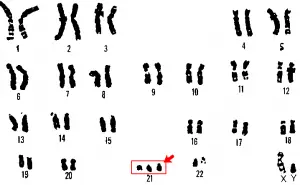With the world abuzz about dwarfism preventing cancer, we wondered: what other sorts of genetic tinkering can, unexpectedly, prevent or cure cancer?
Dwarfism
 Laron syndrome is a genetic disorder that causes dwarfism. Individuals with Laron syndrome possess a mutation on the GHR gene, rendering the gene defective and body insensitive to human growth hormone—hence stunted growth.
Laron syndrome is a genetic disorder that causes dwarfism. Individuals with Laron syndrome possess a mutation on the GHR gene, rendering the gene defective and body insensitive to human growth hormone—hence stunted growth.
In a study recently published in Science Translational Medicine,1 scientists studied 100 Ecuadoreans with Laron syndrome and compared them to 1,600 relatives who were normally proportioned. Over the 22-year course of the study, none of the subjects with Laron syndrome were diagnosed with diabetes, and only one individual reported any tumorous growth (a benign ovarian tumor). Comparatively, of relatives living under the same conditions over the same timeframe, 5 percent were diagnosed with diabetes and 17 percent with cancer.
The Food and Drug Administration has already approved growth-hormone-blocking drugs to treat acromegaly, a type of gigantism, and in the future, these sorts of drugs may be used to prevent cancer or diabetes in high-risk populations.
Down Syndrome
 Individuals with Down syndrome possess an extra 21st chromosome. According to a recent study published in Nature,2 this extra chromosome could decrease an individual’s risk of cancer.
Individuals with Down syndrome possess an extra 21st chromosome. According to a recent study published in Nature,2 this extra chromosome could decrease an individual’s risk of cancer.
One particular gene on the 21st chromosome, Dscr1, regulates blood vessel growth, or angiogenesis. Researchers found that in mice, an extra 21st chromosome—and therefore, an extra copy of the Dscr1 gene—kept abnormal angiogenesis (and resulting tumor growth) in check. To verify that the Dscr1 gene affects humans in the same way, the researchers generated stem cells from skin cells taken from an individual with Down syndrome. They then injected one group of immunocompromised mice with these Down syndrome-derived cells, and another group with cells derived from a chromosomally normal human. In the “normal” group, the mice’s tumors generated networks of blood vessels to feed themselves, but in the “Down syndrome” group, the tumors hardly formed any blood vessels at all.
With this discovery, researchers are looking for ways to target the Dscr1 pathway, starve tumors of blood vessels, and not just treat, but prevent cancer.
Cruciferous Vegetables
 What do broccoli, cauliflower, cabbage, turnip, and watercress all have in common? Sure, they are all vegetables, but they could all also help reduce the incidence of cancer.
What do broccoli, cauliflower, cabbage, turnip, and watercress all have in common? Sure, they are all vegetables, but they could all also help reduce the incidence of cancer.
As members of the cruciferous vegetable family, these foods contain isothiocyanates (ITCs), phytochemicals that fight cancer by working on the tumor suppressor gene p53. When the gene is functioning properly, its proteins play a role in keeping cells healthy and preventing them from starting abnormal growth. When the gene is mutated, p53 fails to provide this protection.
According to a study recently published in Journal of Medicinal Chemistry,3 scientists found that ITCs can remove defective p53 proteins while leaving normal p53 proteins alone. This means that not only was your mother right—you really should finish all your broccoli—but because half of all human cancers include mutated p53 genes, the future of cancer treatment may very well include ITC-based drugs.
| Resources from Wiley on This Topic | |

|
Cancer: Basic Science and Clinical Aspects
by Craig A. Almeida and Sheila A. Barry |

|
Cancer: An Interdisciplinary View
Wiley Interdisciplinary Reviews (WIREs) Collection |

|
Tumor Microenvironment
by Dietmar W. Siemann |

|
Anticancer Therapeutics
by Sotiris Missailidis |
1. Guevara-Aguirre, J., Balasubramanian, P., Guevara-Aguirre, M., Wei, M., Madia, F., Cheng, C., Hwang, D., Martin-Montalvo, A., Saavedra, J., Ingles, S., de Cabo, R., Cohen, P., & Longo, V. (2011). Growth Hormone Receptor Deficiency Is Associated with a Major Reduction in Pro-Aging Signaling, Cancer, and Diabetes in Humans Science Translational Medicine, 3 (70), 70-70 DOI: 10.1126/scitranslmed.3001845
2. Baek, K., Zaslavsky, A., Lynch, R., Britt, C., Okada, Y., Siarey, R., Lensch, M., Park, I., Yoon, S., Minami, T., Korenberg, J., Folkman, J., Daley, G., Aird, W., Galdzicki, Z., & Ryeom, S. (2009). Down’s syndrome suppression of tumour growth and the role of the calcineurin inhibitor DSCR1 Nature, 459 (7250), 1126-1130 DOI: 10.1038/nature08062
3. Wang, X., Di Pasqua, A., Govind, S., McCracken, E., Hong, C., Mi, L., Mao, Y., Wu, J., Tomita, Y., Woodrick, J., Fine, R., & Chung, F. (2011). Selective Depletion of Mutant p53 by Cancer Chemopreventive Isothiocyanates and Their Structure−Activity Relationships Journal of Medicinal Chemistry, 54 (3), 809-816 DOI: 10.1021/jm101199t